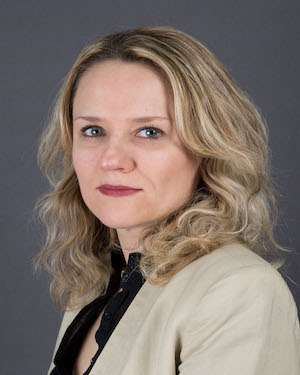Nataša Kovačević

Education
- Ph.D., English, University of Florida
- MA, English and TESOL, University of Kentucky
- BA, English, University of Belgrade, Serbia
Languages
- Bosnian/Croatian/Serbian
- English
- Russian
- Spanish
Interests and Expertise
- postcolonial literature
- postsocialist literature, especially Yugoslav and Russian
- Decolonization and the Global Cold War; the Non-Aligned Movement
- literature and film of migration to the European Union
- multicultural British literature
Check out my personal website for more information.
My first book, Narrating Post/Communism: Colonial Discourse and Europe's Borderline Civilization (Routledge, 2008), focused on (post)communist Eastern Europe as a proto-colonial space, showing how discourses supporting transitions to global capitalism and liberal democracy hinged on an Orientalist stigmatization of communist regimes and Eastern European cultures. I analyze literary texts by anti-communist dissidents and exiles who present themselves as both "Eastern" and "Western" to their audiences, both internalizing and criticizing this Orientalist discourse of inferiority. My second book, Uncommon Alliances: Cultural Narratives of Migration in the New Europe (Edinburgh UP, 2018), builds on the earlier book by analyzing the contemporary uses and meanings of the idea of Europe, especially in the post-9/11 context of the "war on terror" and growing fears of immigration in the European Union. While the European Union portrays itself as a beacon of democracy, diversity, and welfare, I theorize it as a "consensual empire" due to its continued material benefits from unequal power relations with former colonies, internally colonized minority groups, and discriminatory criteria for accession. I examine narratives of migration – in literature, film and performance art – that increasingly address their critique to the European Union, rather than any one of its individual member states, in terms of its treatment of borders, history, and prevailing figurations of political community.
I am currently researching the cultural legacy of the Non-Aligned Movement (NAM). Founded in 1961, NAM, an alternative vision of globalization developed by the Global South and East, was a vast transcontinental alliance of anticolonial liberation movements and newly independent states, joined together by principles of nuclear disarmament, active peaceful coexistence, and respect for national sovereignty. NAM sought to forge a third-way alternative to the domination of world affairs by East-West conflicts, uniting countries across continents and political systems so as to gain global leverage. While recent scholarship has started to explore political, economic, and educational partnerships among NAM members, I am interested in the neglected history of literary, cinematic, and other cultural exchanges that reflected the values of the movement. My new book on these topics, Nonaligned Imagination: Yugoslavia, the Global South, and Literary Solidarities beyond the Cold War Blocs is forthcoming from Northwestern University Press in 2025.
Courses
- LITR 202 World Literature: Current Events
- LITR 360W Recent Trends in British and American Literature
- LITR 422W Novel in Global Perspective
- LITR 443 Women in Literature
- LITR 440: Studies in the Genre
- LITR 480W Studies in Literature and Culture
- LITR 578 Postcolonial Perspectives in Literature
- LITR 580 Recent Trends in Contemporary Literature
Publications and Presentations
Books
- Nonaligned Imagination: Yugoslavia, the Global South, and Literary Solidarities beyond the Cold War Blocs (Northwestern University Press, 2025)
- Uncommon Alliances: Cultural Narratives of Migration in the New Europe (Edinburgh University Press, 2018)
- Narrating Post/Communism: Colonial Discourse and Europe’s Borderline Civilization(Routledge, 2008)
Journal issues
- "Consensual Empires," Special issue of Journal of Narrative Theory, 44.3 (2014)
Selected articles
- "Guest Workers and Non-Aligned Friends: Postsocialist and Postcolonial Solidarity in Želimir Žilnik's Recent Films about Migration," special issue "The Cultures of Global (Post)Socialism," Comparative Literature Studies, 2022
- "Alternative Hospitalities on the Margins of Europe," in Languages of Resistance, Transformation, and Futurity in Mediterranean Crisis-Scapes: From Crisis to Critique, Palgrave, 2020
- "Dissolving into the Sea: Cinematic Migrants and the Problem of Agency,"Postcolonial Studies, 2019
- "Failures of Community: Andrić in Andrićgrad," in Claiming the Dispossession: The Politics of Hi/Storytelling in Post-imperial Europe, Brill, 2017
- “Re-Worlding the Balkans: Films of Voyage to the European Union,” special issue “Myths of Europe: East of Venice,” European Journal of English Studies, 2013
- “Storming the EU Fortress: Communities of Disagreement in Dubravka Ugrešić,” Cultural Critique, 2013
- “Europe as Host/Hostage: On Strange Encounters and Multicultural Love in Contemporary European Cinema,” Interventions: A Journal of Postcolonial Studies, 2012
- “Anti-Communist Orientalism: Shifting Boundaries of Europe in Dissident Writing,” in In Marx's Shadow: Knowledge, Power and Intellectuals in Eastern Europe and Russia, Lexington Press, 2010
- “Late Communist and Post-Communist Avant-garde Aesthetics: Interrogations of Community,” in Postcommunism, Postmodernism and the Global Imagination, Columbia University Press, 2010
- “Yugoslavia, an ‘Almost Forbidden Word’: Cultural Policy in Times of Nationalism,” interview with Dubravka Ugrešić, Women and Performance: A Journal of Feminist Theory, 2007
- “History on Speed: Media and the Politics of Forgetting in Milan Kundera’s Slowness,” MFS:Modern Fiction Studies, 2006
- “Beyond the Politics of Emancipation: Radical (Im)Possibilities in Virginia Woolf,”Lit: Literature Interpretation Theory, 2005
Media and public scholarship
- Article “The Documentary Not in My Country Denies Voice and Agency to Broad Grassroots Opposition to Lithium Mining in Serbia,”LeftEast, 4 April 2025
- Presentation “Revolucionarni putopisi: antikolonijalne borbe na kulturnom frontu” (Revolutionary Travelogues: Anticolonial Battles on the Cultural Front), Symposium “Nonaligned Cultural Exchanges and Transnational Aspects of Yugoslav Culture,” Museum of Yugoslavia, Serbia, 2024
- Podcast “Film i postkolonijalizam” (Film and Postcolonialism), with Saša Markuš, Pompeu Fabra University, and Boris Trbić, Monash University, 2020
- Panel participant, “What Does Europe Want?,” Michigan Quarterly Review launch, Literati Bookstore, Ann Arbor, 2019
- Interview “Jugoslavija se promatra kao neka distopijska budućnost EU,” Novi List, Croatia, 31 October 2018
